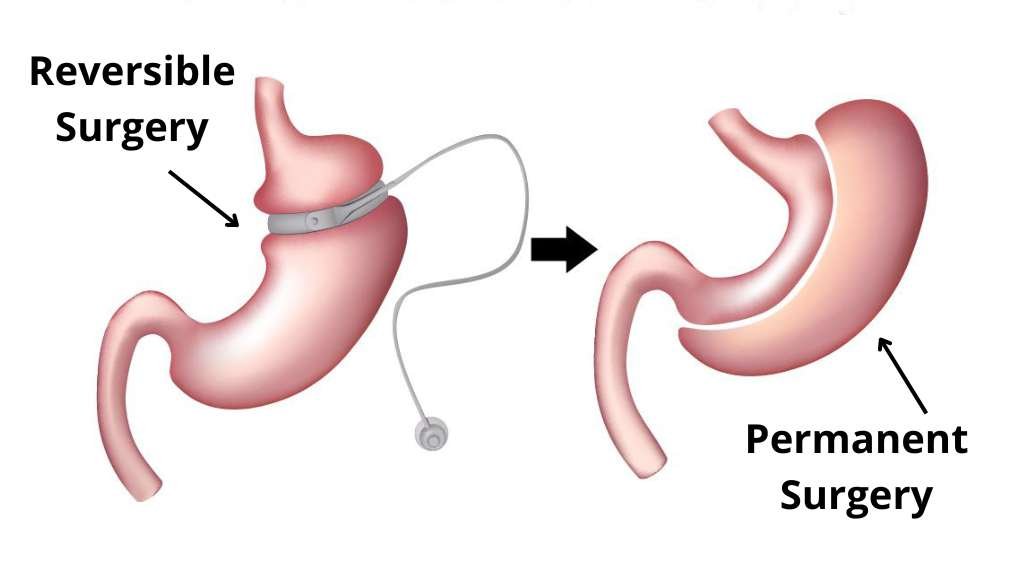Sleeve gastrectomy (gastric sleeve surgery) is a surgical technique often used to help individuals with higher body weight lose weight. This procedure involves removing part of the stomach’s outer curvature, reshaping it into a sleeve-like structure. By reducing the stomach’s capacity to hold food, individuals consume fewer calories, leading to significant weight loss. The primary goal of this surgery is to achieve effective and long-lasting weight loss for obesity, while also potentially reversing the effects of conditions such as type 2 diabetes and high blood pressure.
Immediate Post-Surgery Effects
In the case of gastric sleeve surgery, the patients will immediately observe different effects, achieving weight loss. The individuals who undergo this medical procedure experience loss of appetite, early satiety, and additional weight loss during the initial period. As a result of the smaller capacity of the stomach, people get less food, and thus take in fewer calories. Therefore, they manage to reduce the weight. Sometimes, after the surgery, patients become aware of these things immediately, which often brings encouragement to keep healthy eating habits and a great change in lifestyle.
Long-Term Weight Loss
Gastric sleeve surgery has turned out to be an excellent tool for weight loss, promising longer-term achievements. Prospective research findings indicate that patients can sustain significant weight loss for several years post-surgery. The extent of weight loss varies among individuals and hinges on factors such as initial weight, adherence to dietary and exercise guidelines, and overall health. Studies also demonstrate that patients can maintain substantial weight loss long after the postoperative period. This long-term weight reduction contributes to improved overall health and enhanced quality of life for those undergoing gastric sleeve surgery.
Improvement in Obesity-Related Health Conditions
Gastric sleeve surgery not only promotes weight loss but also offers associated health benefits for individuals with higher body weights. For example, after bariatric surgery, patients with type-2 diabetes often experience improved glycemic control, and some may even reduce or eliminate their medications. Higher body weight contributes to conditions like high blood pressure, but as body mass index (BMI) levels decrease, the risk of heart disease or stroke also decreases. Besides, some conditions, like sleep apnea, could be improved as weight decreases, which is caused by pauses in breathing during sleep. In addition, good sleep quality may be improved with the help of losing weight.
Nutritional Considerations
Even after gastric sleeve surgeries, patients need to switch to healthy eating habits with long term benefits for health and weight loss. It means that one should make the choice of protein-rich meals plus fresh fruits, vegetables, and whole grains. Due to the reduced stomach size post-surgery, patients should prioritize nutrient-rich foods and avoid high-calorie, low-nutrient options. Additionally, vitamin and mineral supplements are crucial to prevent deficiencies common in smaller stomachs. Adequate protein intake supports muscle maintenance and overall health. Proper hydration and portion control are also essential components of postoperative nutrition.
Changes In Life Quality
The effects of gastric sleeve surgeries on a long-term period seem to be more than just losing weight and health. Many clients show improvements in their life quality rating and perceived overall health. Excess weight reduction allows individuals to participate in activities they couldn’t before. As they begin to enjoy these activities, their mobility and fitness levels improve. Improved self-esteem and a better body image are common psychological effects, helping patients feel more confident and satisfied with their appearance. Weight loss also reduces stress levels and enhances mental well-being, along with improving social interactions. These factors collectively contribute to enhancing the overall quality of life for patients who have undergone gastric sleeve surgery. These benefits are therefore not only physical but emotional healing as well.
Potential Risks
Although the gastric sleeve operation has been found to be both safe and effective in the vast majority of cases, long term complications or risks should still be taken into consideration. Some of these may include:
Nutritional Deficiencies
However, a smaller stomach results in a decline in nutrient absorption, which poses a challenge for patients. It could therefore result in a lack of important vitamins and minerals such as vitamin B12, iron, calcium, and others.
Gastroesophageal Reflux Disease (GERD)
People’s reflux symptoms could also be heartburn or regurgitation after the surgery. This takes place when the contents in the stomach go up the glottis.
Stomal Stenosis
This condition, known as the narrowing of the stoma (surgical site) that connects the remaining stomach to the intestine, may cause food to have difficulty passing through and may sometimes require intervention.
Dumping Syndrome
The small intestine is affected when stomach contents, particularly those high in sugars and fats, are rapidly emptied, leading to symptoms such as vomiting (partial or complete), increased body temperature, and diarrhea.
Although some complications may be challenging to manage or prevent entirely, adhering to post-operative protocols, receiving proper care, and attending follow-up appointments with healthcare professionals can significantly mitigate these risks. In such instances, advices on perfect diets, supplements, remedies, and drugs might be suggested to help in effectively addressing issues.
FAQs
- What are the long-term effects of gastric sleeve surgery on weight loss?
Gastric sleeve surgery can result in long-term weight loss, with patients frequently describing important changes in their body weight and obesity-related health issues. - Are there any nutritional deficiencies or complications in the long term after gastric sleeve surgery?
While gastric sleeve surgery generally seems safe, long-term monitoring for nutritional deficiencies, such as vitamin and mineral deficiencies, is critical. Regular follow-up sessions and attention to nutritional instructions can help avoid issues. - How does gastric sleeve surgery impact overall health in the long term?
Gastric sleeve surgery has been found to improve long-term health by reducing the risk of obesity-related diseases like type 2 diabetes, hypertension, and sleep apnea. - Can patients regain weight in the long term after gastric sleeve surgery?
However, weight regain can happen in some patients, maintaining a healthy lifestyle, including a balanced diet and regular exercise, is important for long-term weight control success after gastric sleeve surgery.
- What is the role of follow-up care in managing the long-term effects of gastric sleeve surgery?
Regular follow-up consultations with your doctors are required to evaluate long-term effects, treat any issues that arise, and offer continuous support for the best possible outcome after surgery.













